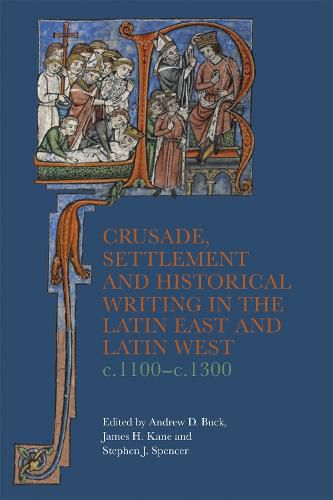Readings Newsletter
Become a Readings Member to make your shopping experience even easier.
Sign in or sign up for free!
You’re not far away from qualifying for FREE standard shipping within Australia
You’ve qualified for FREE standard shipping within Australia
The cart is loading…






This collection offers a holistic understanding of the impact of both crusading and settlement on the literary cultures of Latin Christendom. The period between the First Crusade and the collapse of the "crusader states" in the eastern Mediterranean was a crucial one for medieval historical writing. From the departure of the earliest crusading armies in 1096 to the Mamluk conquest of the Latin states in the late thirteenth century, crusading activity, and the settlements it established and aimed to protect, generated a vast textual output, offering rich insights into the historiographical cultures of the Latin West and Latin East. However, modern scholarship on the crusades and the "crusader states" has tended to draw an artificial boundary between the two, even though medieval writers treated their histories as virtually indistinguishable.
This volume places these spheres into dialogue with each other, looking at how individual crusading campaigns and the Frankish settlements in the eastern Mediterranean were depicted and remembered in the central Middle Ages. Its essays cover a geographical range that incorporates England, France, Germany, southern Italy and the Holy Land, and address such topics as gender, emotion, the natural world, crusading as an institution, origin myths, textual reception, forms of storytelling and historical genre. Bringing to the foreground neglected sources, methodologies, events and regions of textual production, the collection offers a holistic understanding of the impact of both crusading and settlement on the literary cultures of Latin Christendom.
$9.00 standard shipping within Australia
FREE standard shipping within Australia for orders over $100.00
Express & International shipping calculated at checkout
This collection offers a holistic understanding of the impact of both crusading and settlement on the literary cultures of Latin Christendom. The period between the First Crusade and the collapse of the "crusader states" in the eastern Mediterranean was a crucial one for medieval historical writing. From the departure of the earliest crusading armies in 1096 to the Mamluk conquest of the Latin states in the late thirteenth century, crusading activity, and the settlements it established and aimed to protect, generated a vast textual output, offering rich insights into the historiographical cultures of the Latin West and Latin East. However, modern scholarship on the crusades and the "crusader states" has tended to draw an artificial boundary between the two, even though medieval writers treated their histories as virtually indistinguishable.
This volume places these spheres into dialogue with each other, looking at how individual crusading campaigns and the Frankish settlements in the eastern Mediterranean were depicted and remembered in the central Middle Ages. Its essays cover a geographical range that incorporates England, France, Germany, southern Italy and the Holy Land, and address such topics as gender, emotion, the natural world, crusading as an institution, origin myths, textual reception, forms of storytelling and historical genre. Bringing to the foreground neglected sources, methodologies, events and regions of textual production, the collection offers a holistic understanding of the impact of both crusading and settlement on the literary cultures of Latin Christendom.